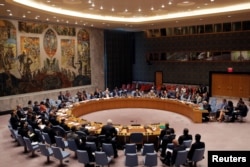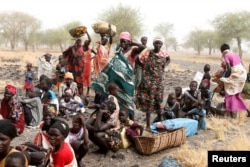The U.N.’s top official in South Sudan says President Salva Kiir has formally launched a long-awaited national dialogue and declared a unilateral cessation of hostilities.
“While the National Dialogue could bring a welcome focus on reconciliation, for it to be credible, it will need the genuine participation of opposition constituencies,” David Shearer told the U.N. Security Council via a video link Wednesday from Juba. “Meanwhile, opposition groups have come together around a common position and jointly denounced the National Dialogue,” he added.
Kiir also announced a unilateral cease-fire and said he would review the cases of political prisoners. Shearer expressed some skepticism, noting it was not the first time Kiir had declared a cessation of hostilities and added that there would be “close scrutiny” on the number of prisoners actually released.
South Sudan’s U.N. envoy Joseph Mourn Malok told council members the cease-fire is intended to create an inclusive environment for the national dialogue and to allow the movement of humanitarian aid to famine-hit areas.
The U.N. mission in South Sudan has had to cope with little cooperation from Kiir’s government.
“There is war, there is famine, our peacekeepers are operating in very, very difficult conditions,” new U.N. peacekeeping chief Jean-Pierre Lacroix told reporters.
“They do not get the kind of support and cooperation they would deserve from the parties, particularly from the government,” he added.
Sanctions
One route the council has gone to try to force better cooperation is through sanctions on spoilers, those who obstruct efforts by the United Nations to halt the fighting. On Wednesday, the council unanimously extended the sanctions regime on South Sudan for another year.
But the possibility of imposing an arms embargo to stem the violence still appeared beyond reach, as veto-wielding member Russia expressed its long-held opposition to such a measure.
“Solid peace in South Sudan is not going to be brought about by a Security Council arms embargo, but rather by progress on the political solution, as well as targeted measures for the disarmament of civilians, demobilization and reintegration of combatants,” said Russia’s U.N. envoy Petr Illichev.
Rainy Season Begins
Meanwhile, the rainy season has begun, which means the country’s rudimentary roads will be unpassable for the next four months. While this will force a reduction in fighting, it will increase the challenge to humanitarian workers in getting aid to those in dire need, including in two counties that have already been declared famine zones.
Shearer said cholera, a potentially deadly water-borne disease, has been on the rise, with 7,700 cases recorded.
Aid workers must also contend with one of the most dangerous working environments in the world, with 84 humanitarians killed since the conflict began in December 2013. This year, 17 aid workers have been killed in South Sudan.







